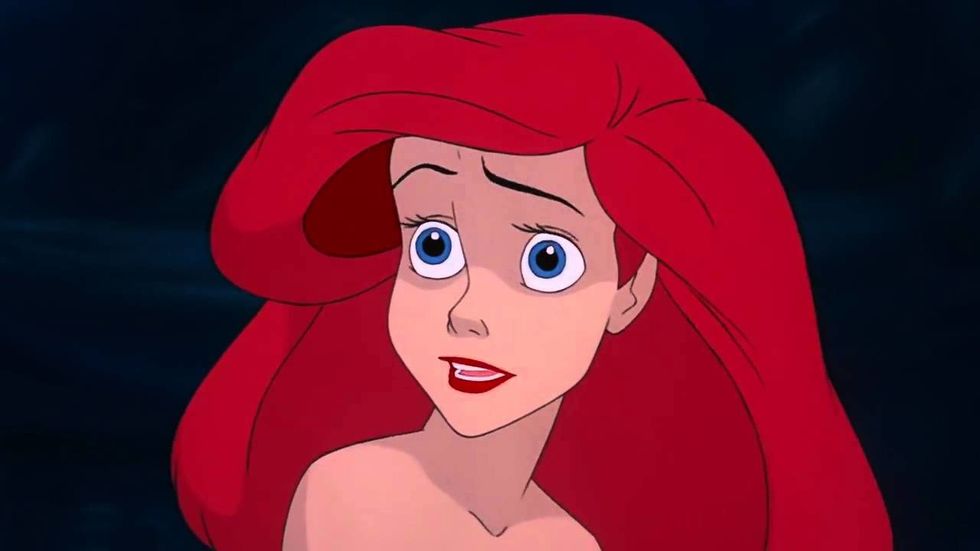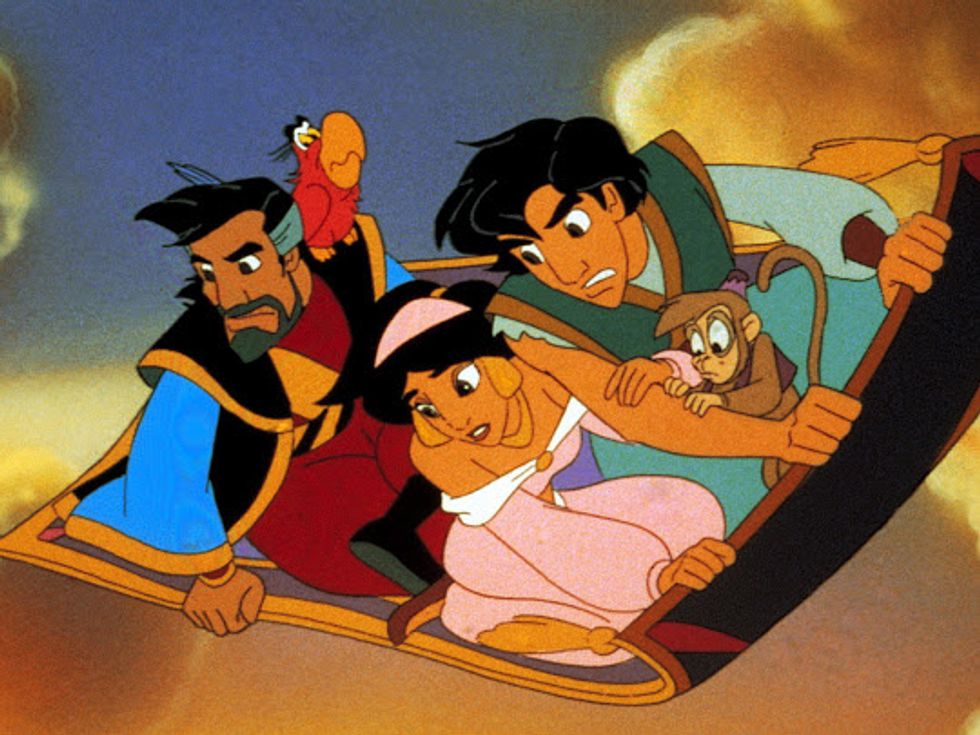Film
Does It Matter That Ariel’s Black if It’s Still a White Person’s Story?
16 Jul, 19
Disney’s live-action remakes may seem progressive on the surface, but they really just amount to cheap, safe, Hollywood liberalism written by white men.
That’s not exactly “progress.”
The Little Mermaid (1989) isn’t a progessive film in the first place—like, in any way. The entire premise revolves around a teenage mermaid who sees a hot guy in a boat and goes: “Wow. He’s hot. I will do literally anything to get him to notice me.” That’s it. Sure, there’s a little about “true love” and social alienation, but mostly it’s the story of a desperate teenager seeking escape from her monotonous (and emotionally abusive) life in the arms of an attractive man. Upon rewatching, Ariel certainly could use an update.
 Yes Ariel, you’re basic.The Little Mermaid 1989
Yes Ariel, you’re basic.The Little Mermaid 1989
Disney seemed to have a similar thought. “What’s the laziest way we can revitalize this property to milk more money out of our millennial, nostalgia-hungry fans?” The answer was simple—make a beloved character just a little different. Make her black.
Their decision to cast a black actress for the role of Ariel has been met with widespread acclaim and celebration, with some outlets calling it a “an exciting step forward.” So, in the spirit of this excitement, let’s acknowledge the good:
- Black representation in mainstream, commercial films is embarrassingly low, especially from household names like Disney. Live-action Ariel is the first black princess since Tiana in 2011’s depressingly underwhelming Princess and the Frog. More ethical representation is necessary.
- Halle Bailey has an incredible singing voice and will probably do a great job as Ariel.
- People seem genuinely excited about this casting. Little girls and boys of color will have a new princess to see themselves in, and that’s a f**king beautiful thing.
Okay, that’s all great. But as a person of color who loves big-budget movies, I can’t help but feel that casting a black Ariel is a superficial way to appeal to the public’s growing demand for ethical cultural representation. On its surface, this film’s casting promises something that it is very clearly not going to do—tell an actual black story. I would argue that portraying an authentic minority experience is far more important in our current media landscape than simply giving an old, outdated story a face-lift. Don’t we deserve a new black princess? One who represents the times and values that we live in today? The only black representation in 1989’s The Little Mermaid was a problematic crab, and I’d rather not revisit the era when that was okay.
 THERE ARE SO MANY ISSUES WITH THIS The Little Mermaid 1989
THERE ARE SO MANY ISSUES WITH THIS The Little Mermaid 1989
On the other hand, Disney’s new princess films do seem to be more culturally conscious these days. Disney hired a whole team of anthropologists, historians, and cultural practitioners from the Polynesian diaspora to oversee the production of the 2016 animated feature Moana. That paid off. Not only was the movie a financial success, but it ended up being impactful to people of color, because Moana’s story was influenced by the culture she came from. As Hugo Award-nominated film critic Lindsay Ellis put it: “The plot [of Moana] derives from lessons Moana learns about her own culture. The story isn’t about a young girl finding herself, but discovering that her ancestors did incredible things and the joy of discovering that.” If black Ariel could get the same level of cultural attention paid to her story, that actually wouldn’t be so bad…
But here’s the rub. In the midst of all our high-fiving and (admittedly dope) fan art, we’re missing the bigger picture: Disney is only interested in our money. I’ll let ex-Disney CEO Micheal Eisner emphasize this point through an internal memo he penned in 1981 to his team of executives: “We have no obligation to make art. We have no obligation to make history. We have no obligation to make a statement – but to make money. …In order to make money, we must always make entertaining movies, and if we make entertaining movies, at times we will reliably make history, art, a statement, or all three.”
 What we’ve always wanted… Aladdin’s dad.Aladdin: King of Thieves
What we’ve always wanted… Aladdin’s dad.Aladdin: King of Thieves
Even today, Disney still seems to live by this ethos. It’s clear that money is the core driving force behind all of these mediocre live-action remakes of beloved properties. Disney has been repackaging and reselling us the same s**t for decades, from re-releasing “Disney classics” like Pinocchio and Snow White on VHS, (and then DVD…and then Blu-ray…) to making a bazillion direct-to-video sequels like Lady and the Tramp II: Scamp’s Adventure and Beauty and the Beast: Belle’s Magical World. Live-action remakes are just Disney’s newest tchotchke to shill, but with a twist. These movies need to match up to the “millennial sensibility,” the “liberal discourse.” They need to be steeped in the kind of zeitgeist that demands think pieces and twitter hashtags. As Lindsay Ellis said in her 2018 video essay about Disney’s Beauty and the Beast remake: “These live-action remakes seem to pose themselves not as simple remakes, but as responses to criticisms of the films that they are remaking.”
The simple truth is that Disney is in the business of making popular movies to make money, and they will follow any trend necessary to do that. Many millennials, including myself, want to see a socially conscious coming-of-age Disney movie featuring a woman of color. Is the new Little Mermaid going to be that story about a young black mermaid exploring the consequences of her identity, both as a princess and a global citizen of the world? Maybe! But from the looks of its current writers, probably not. For now, we can only speculate. The one thing we do know for sure is that Disney is more than willing to address the cultural anxiety around identity and representation in order to get at our sweet, sweet cash.
So it’s up to you, the consumer, to decide: Is commodifying representation appropriate for this particular Disney princess story? When it comes out in 2020-something, we’ll get to answer this question with our wallets. But in the meantime, I implore you to think carefully about the praise you give to a hundred-billion dollar media conglomerate. They don’t have the best track record with cultural representation, and I’m not so sure this new Little Mermaid film is going to be the princess story we deserve.
- Chloe Bailey Speaks Out After Internet Backlash – Popdust ›
- Shaggy’s Costume as Sebastian in “The Little Mermaid LIVE!” – Popdust ›
- ‘Little Mermaid’ Can Be Black, Disney’s Freeform Says After Surprise … ›
- ‘Little Mermaid’ Reboot Casts Halle Bailey as Ariel – Variety ›
- Disney’s live-action Little Mermaid will star a black Ariel ›
- The Backlash Over The Little Mermaid Casting a Black Ariel Is Fake … ›
- Racists Are Attacking Black Ariel With Mermaid Science | Cracked.com ›
- Disney’s black Ariel isn’t just about diverse representation. It’s also … ›














